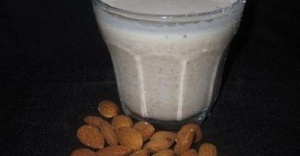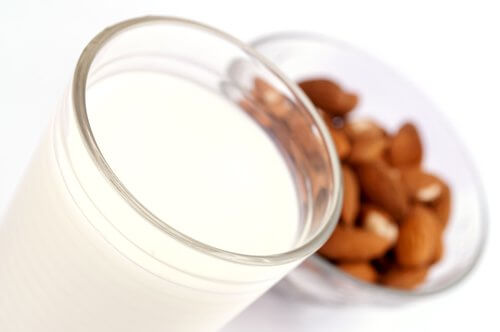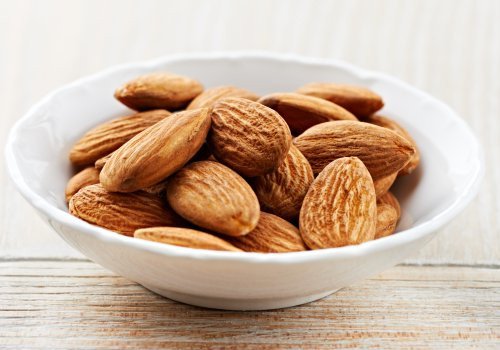Benefits of Almond Milk and Some Side Effects


Written and verified by the pedagogue in physical education and nutritionist Elisa Morales Lupayante
Almond milk is one of the best foods to help you lose weight. It is lactose-free and rich in antioxidants and essential minerals like potassium and calcium. It is the perfect substitute for cow’s milk since it is low in cholesterol, has a delicious almond flavor that is rich in vitamins, and even has fewer calories than soy milk. So, let’s take a look at those great benefits of almond milk.
Properties of almond milk
One of the main aspects of almond milk is that it is free of gluten, lactose, and cholesterol. Additionally, since it has the same consistency as cow’s milk, it can be used the same way.
Almond milk also has a large amount of vitamin E which is a natural antioxidant that helps prevent cancer and slows the aging process. In addition to vitamin E, it also has vitamins D and vitamin A, proteins, Omega 6, zinc, calcium, iron, magnesium, and potassium.

While it shares some properties of soy milk, it has a lower calorie count. Here is an example: a glass of cow’s milk has 140 calories, rice milk has 120, soy milk has 80, and almond milk has 40 calories. If the almond milk is sugar-free, it only has 30 calories per glass.
Finally, almond milk has large amounts of soluble and insoluble fiber. This protects the intestinal wall and colon, helps regulate sugar absorption, and controls cholesterol levels.
On the other hand, we recommend you check the label since the nutritional value of different brands can vary. Regardless, almond milk is the most wholesome and nutritional substitute for cow’s milk available today.
We recommend you read:
How to Lose Weight by Reducing Your Daily Caloric Intake
8 benefits of almond milk

Almond milk has many properties that can benefit many people’s health. If you want to lose weight, regulate your cholesterol, or help control your gastritis, you should drink some almond milk every day. We are about to share 8 benefits of almond milk and explain why you should include it in your diet:
- It has a low-calorie count which makes it perfect for anyone who wants to lose weight. Substituting almond milk for cow’s milk in your daily diet can really help you lose those extra pounds. It is also a pretty convenient substitute since it has a lot of similar characteristics and a similar consistency to that of almond milk.
- Almond milk is great if you have high levels of cholesterol and triglycerides since it improves good cholesterol (HDL) levels and reduces bad cholesterol (LDL)) levels. Just so you can have a little comparison, it reduces cholesterol twice as much as olive oil. It also strengthens your heart.
- It helps intestinal absorption of sugars and fats.
- Almond milk is easily digested and recommended for those who are lactose intolerant. This makes digestion a lot easier for you.
- It helps with drained potassium levels that you suffer from with diarrhea and vomiting. Almond milk has high levels of potassium and helps resupply this in the body.
- The fiber in almond milk helps protect the intestinal wall.
- A lot of people who suffer from gastritis or other gastrointestinal issues add almond milk to their diet to help regulate its functions.
- The vitamin B2 in almond milk helps strengthen nails and hair. It also helps keep your skin looking hydrated.
Side effects of almond milk
Now that we know the benefits of almond milk, let’s looks at its side effects. Not even almond milk can be considered the perfect food. It has certain warnings and side effects that you should consider before you make it a regular part of your diet.
Negative impact on the thyroid

Almonds are a goitrogenic food which means they contain natural chemicals that may prevent your body from correctly absorbing and using iodine in the body. This can have a negative effect on the thyroid.
Foods like soy, cabbage, linseed, broccoli, and almonds cause the thyroid to expand. Thus, if you eat too much of these foods, the chemical products contained in these foods can block the iodine and lead to the formation of tumors.
While goitrogens are damaging to your health in large quantities, they can actually be very good for the human immune system. However, if you have an under-active thyroid, you really need to make sure that you don’t eat too many of these foods in large amounts. Therefore, anyone who has a low-functioning thyroid should really avoid almond milk.
If you have a healthy functioning thyroid, on the other hand, drinking almond milk in moderation each day will really have no negative effects on this gland.
Don’t let babies drink it
Using soy or almond milk in place of the mother’s milk in the baby bottle tends to be a risky substitution. Almond milk just doesn’t supply a baby with the nutrition he or she needs. If you opt for almond milk in place of breast milk or baby formula, the baby will likely suffer from malnutrition and may have health problems that last the rest of their lives.
Even occasionally using almond milk instead of breast milk or formula can be dangerous. Studies at the American College of Nutrition have found that babies that drink almond milk develop an autoimmune thyroid disease. Those chemicals that produce goiter add up a lot more in the body of a baby than the body of a full-grown adult. That’s why you should avoid almond milk even in moderation as an infant.
Too much sugar
One of the most obvious issues with almond milk is it has a large amount of sugar. Even though almond milk doesn’t naturally have any sugar, most manufacturers add sugar to improve the flavor of the milk.
Most options on the market today have about 20 grams of sugar per serving. Fortunately, there are now almond milk brands with no sugar and less than 1 gram of carbohydrates available for sale. That is why it is always important to check the label to make sure you know what you are drinking.
Recipe to make your own almond milk

Almond milk is really easy to make. You just need a cup of raw almonds, three cups of water, salt, and sugar. To make your own just follow these simple steps:
- Soak raw almonds overnight, or for eight hours at the very least.
- Then you need to strain the almonds and rinse them off with clean water.
- Add the almonds and three cups of water to the blender.
- Blend for 10 minutes. You should change the speed that you blend throughout. For example: blend it on a low setting for 3 minutes, then a high setting for 3 minutes, and follow this pattern.
- After, when you finally have a well-blended white liquid, you can add some sugar or honey to sweeten it, and a pinch of salt.
- You should then strain the contents of the blender through a cheesecloth so you have a residue-free milk.
- Voila! You have yourself some almond milk! Now you can reap all the benefits of almond milk.
One of the benefits of almond milk is its white color and its cow’s milk-like texture. You can add it to your cereal, your coffee, you can drink it by itself, or you can even use it as an ingredient in healthy and nutritious recipes.
Some ideas
Here are some practical, vegetarian recipes you can use almond milk to make:
Four-person recipe for onion salsa
Ingredients:
- 250 grams of onion
- 2 spoonfuls of cream
- 1 glass of almond milk
- Salt
- Olive oil
To make this recipe you need to finely chop the onion and steam them with a little bit of olive oil. After five minutes, add some almond milk, salt, and cream. Last but not least, you just need to mix up all of the ingredients.
Four-person vegetable pâté
Ingredients:
- 100 to 150 grams of croutons
- 1/4 liter of almond milk
- 30 grams of pitted black olives
- 2 finely chopped, large onions
- 2 shredded carrots
- Mixed greens
- 2 cloves of garlic
- Tomato sauce
- Sunflower seed oil
- Salt
To prepare this recipe, you need to soak the croutons in almond milk for several hours. You then need to steam the onions and garlic. Then, mix the ingredients together and put them in a cake pan with some oil. Bake it for 30 minutes. After you let it cool a while, it is ready to eat. You can also add some tomato sauce on top if you’d like.
Now, take the full advantage of the benefits of almond milk with these recipes, and make sure you are aware of its possible side effects.
All cited sources were thoroughly reviewed by our team to ensure their quality, reliability, currency, and validity. The bibliography of this article was considered reliable and of academic or scientific accuracy.
- Dhakal, S., Liu, C., Zhang, Y., Roux, K. H., Sathe, S. K., & Balasubramaniam, V. M. (2014). Effect of high pressure processing on the immunoreactivity of almond milk. Food Research International. https://doi.org/10.1016/j.foodres.2014.02.021
- Pal, A., Lobo Melita, M., & Khanum, F. (2013). Extraction, purification and thermodynamic characterization of almond (Amygdalus communis) ??-galactosidase for the preparation of delactosed milk. Food Technology and Biotechnology. https://doi.org/10.1242/dev.02185
- Briviba, K., Gräf, V., Walz, E., Guamis, B., & Butz, P. (2016). Ultra high pressure homogenization of almond milk: Physico-chemical and physiological effects. Food Chemistry. https://doi.org/10.1016/j.foodchem.2015.06.063
This text is provided for informational purposes only and does not replace consultation with a professional. If in doubt, consult your specialist.








